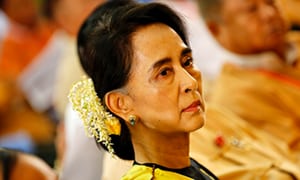What makes someone an effective leader? Arguably, one vital component is being a capable and willing protector of one’s people. Aung San Suu Kyi, the State Counselor of Myanmar and also a Nobel Laureate, is currently failing in this role. She continually chooses to “protect” only the Buddhist majority of Myanmar by supporting the government of Myanmar’s stance that the Rohingya, long time inhabitants of the Rakhine region of Myanmar, are not citizens. Their lack of legal citizenship has been used as justification by the state to perpetrate atrocities against the Rohingya, who are denied civil rights. These atrocities escalated this August when Rohingya militants attacked Burmese security forces. In retaliation, the Burmese military launched a violent crackdown against the Rohingya, killing hundreds of people, and forcing hundreds of thousands to flee into Bangladesh. There is little doubt left that Myanmar has begun a state sanctioned ethnic cleansing of the Rohingya, using the violence perpetrated by a few Rohingya militants to justify the mass slaughter of an ethnic population.

Aung San Suu Kyi has been sung as an icon of democracy by many humanitarian figures. Many people view her as having ushered in a new era for her country after a militarized Burma transitioned into a democratic Myanmar. But when one takes into consideration the politics weighing on Suu Kyi, as well as her unwavering support of the Rakhine Buddhist’s interests over the Rohingya, the truth of Suu Kyi’s leadership becomes clear: Suu Kyi is nothing more than a figurehead who is incapable and unwilling to protect the lives of all peoples residing within Myanmar. Her only purpose is to provide the façade of a “democracy” in what is still a predominantly military state.
When Burma transitioned into Myanmar, those previously in power drafted into the new constitution a guarantee that the military would always have at least twenty-five percent of the seats in Myanmar’s parliament. As a result, the military still holds significant power within the country, impeding the democratic process by removing the Burmese people’s ability to fully participate. Furthermore, Suu Kyi’s title of State Chancellor is a legally powerless one as there is no mention of the position in Myanmar’s constitution since it was created by Suu Kyi after the constitution’s inception. If the military decided Suu Kyi no longer served their interests she could be driven from her position. Thus, it would be no surprise that Suu Kyi feels extensive pressure to continue to support these discriminatory policies because of her relatively precarious position in the Myanmar government.

If we regard only domestic political pressures, we are presented with an image of Suu Kyi as an unwilling actor of the Rohingya genocide. But is she unwilling? It was only very recently that she acknowledged the violence after having previously denied it. She has even laughed at the allegations, which further illustrates contempt for the Rohingya. In a recent phone call with the Turkish President Recep Tayyip Erdogan, Suu Kyi said that she is determined to deal with the “terrorist problem” and that reports of genocide are merely fake news propagated by terrorist sympathizers.
Myanmar is attempting to present itself as a legitimate democracy to the world, using state sovereignty as a defense against international inquiry and obscuring the primary power of the state, the Myanmar military. Suu Kyi’s actions reveal the true nature of her position, a figurehead beholden to the military’s will. But she has also shown herself to be simply unwilling to aid the persecuted Rohingya through her continued vilification of them. These factors combine into, at the very least, a damning complicity by Suu Kyi to the unfolding genocide of the Rohingya people.
Rebecca Dekker is an undergraduate student at the University of Minnesota, Twin Cities. She is majoring in the Sociology of Law, Criminology, and Deviance, and minoring in Global Studies. Her academic interests include the roles of moral panic and the bystander effect during atrocities, as well as the various applications of restorative and retributive justice post-atrocity.

Comments 1
protect javascript code — September 22, 2017
Suu Kyi’s actions reveal the true nature of her position, a figurehead beholden to the military’s will